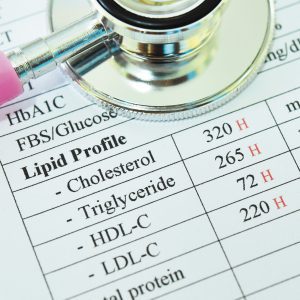 Did you know you can have high cholesterol—which can put you at risk for heart attack and stroke—but not know it? Here is some more information about cholesterol and how to manage it.
Did you know you can have high cholesterol—which can put you at risk for heart attack and stroke—but not know it? Here is some more information about cholesterol and how to manage it.
Cholesterol is Important to Your Body.
Your body needs cholesterol to build cells and make vitamins and other hormones. We get it from the food we eat (animal sources), and it’s also made by our own body. There are two types of cholesterol: HDL, which stands for high-density lipoprotein and LDL, which stands for low-density cholesterol. We all have both kinds in our bodies all the time.
• HDL or “good” cholesterol — This helps protect our body. It helps prevent the “bad” cholesterol from sticking to artery walls, which helps lower the risk of heart disease and stroke.
• LDL or “bad” cholesterol — This can cause build-up on blood vessel walls. This causes your arteries to narrow, which means there’s a smaller “pipe” for blood to flow through to your heart and other organs. This raises your risk of heart disease and stroke.
September is National Cholesterol Education Month. The American Heart Association urges us all “know our numbers, and what to do about them.” For people 65 years and older, your doctor will likely check your cholesterol at least once a year via a simple blood test. Your doctor may want to check it more often if you have a history of high cholesterol or other conditions.
In addition to health issues, other risk factors that can contribute to high cholesterol include age, gender and lifestyle choices. Of these, you can control your lifestyle choices. Examples include:
• Eating healthy — Eat fewer red meats and dairy products and sugary drinks. Eat vegetables, fruits, lean and plant-based proteins in your diet.
• Exercising – Get at least 150 minutes per week of exercise, like walking or riding a bike.
• Stop Smoking – Even if you’re not a smoker, try to avoid secondhand smoke as much as possible.
• Less Alcohol – Limit how much alcohol you drink.
It’s important to talk to your doctor if you have concerns that you are at risk for high cholesterol. Most screenings and preventive resources are covered under your Florida Blue Medicare plan.
Source: heart.org/en/health-topics/cholesterol
Florida Blue and Florida Blue Medicare are Independent Licensees of the Blue Cross and Blue Shield Association.
Call your local agent today
1-352-353-3399
Dell Richards
 Central Florida Health and Wellness Magazine Health and Wellness Articles of the Villages
Central Florida Health and Wellness Magazine Health and Wellness Articles of the Villages



